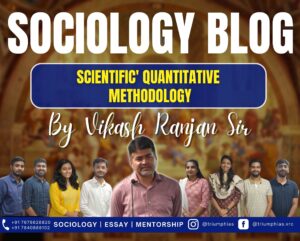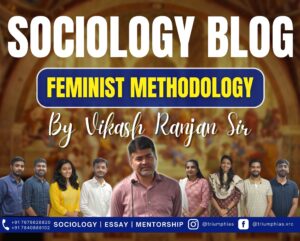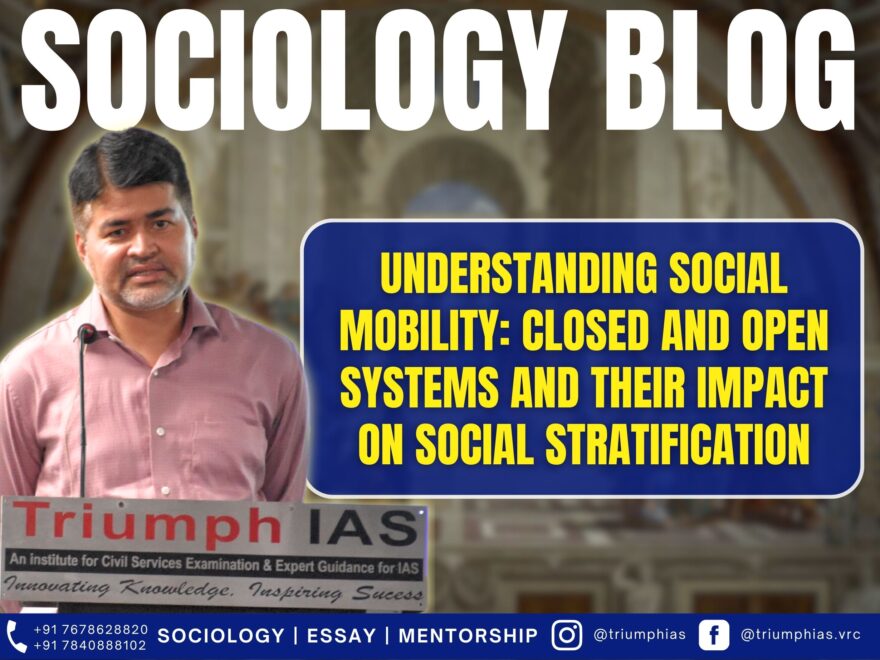Social Mobility
(Relevant for Sociology Optional for Civil Services Examination)

Individuals’ recognition in society is determined by the statuses they hold and the roles they fulfill. Both society and individuals are constantly changing. Men consistently strive to improve their social statuses, aiming to move from lower positions to higher ones and secure better job opportunities. Conversely, individuals of higher status may, for various reasons, experience downward mobility to lower positions. This ongoing movement up and down the status scale is known as social mobility. The study of social mobility is a significant aspect of social stratification, as it is intricately linked to the nature of the stratification system. This system involves categorizing individuals into different layers or strata based on their social standing.
According to Wallace and Wallace, social mobility refers to the movement of a person or persons from one social status to another. W.P. Scott defines sociology as the movement of an individual or group from one social position to another.
In other words, social mobility involves movement across the social structure. The concept of social mobility is classically defined by Pitrim A. Sorokin. Sorokin explains that this shift in position can be undertaken by an individual or a social object or value. Essentially, anything that has been created or influenced by human activity can experience social mobility. It involves the reorganization of the gradation within a society, typically based on power, prestige, and privileges. In such societies, a hierarchical structure operates.
The closed system
The closed system emphasizes the hierarchical nature of the society, justifying the unequal distribution of means of production, status symbols, and power positions. It discourages any efforts to alter this arrangement or promote social mobility, and any such attempts are systematically suppressed. In a closed system, individuals are assigned their positions in the social structure based on ascriptive criteria such as age, birth, and sex. Functional suitability or ideas of equal opportunity are not considered relevant when determining the positions of individuals in various statuses.
Open system
In an OPEN SYSTEM, there are norms that promote and encourage social mobility. The system operates with independent principles of ranking, such as status, class, and power. In an open system, individuals’ positions in the social structure are determined based on their merit or achievements. Open systems are characterized by occupational diversity, a flexible hierarchy, differentiated social structure, and rapid changes. Ascription-based corporate groups like caste, kinship, or extended family have less influence in such systems. The dominant values in an open system emphasize individual equality, freedom, and a willingness to embrace change and innovation. For instance, the caste system in India restricts social mobility, whereas the social class system in industrial societies offers significant opportunities for social mobility.
In Broader perspective there are four forms of social stratification having specific patterns of social mobility
- Slavery System: Social mobility in the slavery system was limited to two ways – manumission and rebellion. Manumission involved the unconditional release of a slave from their state of slavery. On the other hand, rebellion allowed a slave to escape their sufferings by fleeing to the countryside or becoming a fugitive. Thus, social mobility in the slavery system followed a unique pattern.
- Estate System: Social mobility in the estate system was granted through the favor of the monarch, who could bestow a higher rank on an individual. Another avenue of mobility was through occupational guilds, where individuals could advance based on their skills and loyalty. Marriage also played a significant role in social mobility, especially for women.
- Caste System: The caste system is an example of a closed stratification system, where an individual’s position is largely ascribed and fixed at birth, allowing little room for change in status. Although social mobility is limited, there are some avenues available, such as flexibility in the political system, opportunities in land cultivation, Sanskritisation, and hypergamy. Normatively, the caste system prescribes limited mobility and emphasizes membership based on birth, endogamy, and the belief in Karma theory.
- Class System: The class system, on the other hand, is an example of an open system of stratification, offering numerous opportunities for social mobility. In class-based societies, individuals are placed in the class hierarchy primarily based on their achievements. Achievement becomes the most important avenue for social mobility in the class system. Although there are still some barriers and restrictions to mobility, such as gender disparities in high-ranking corporate positions or the limited representation of certain groups in top positions, the class system promotes equality of opportunity and an open model of mobility.
- It is worth noting that the rate of social mobility may affect class formation. High rates of social mobility can lead to increased class solidarity and cohesion. However, according to Lipset, the rate of social mobility shows a basic similarity across industrial societies, with no clear association between mobility rates and economic growth. Social mobility tends to become relatively high once industrialization reaches a certain level in a society.

To master these intricacies and fare well in the Sociology Optional Syllabus, aspiring sociologists might benefit from guidance by the Best Sociology Optional Teacher and participation in the Best Sociology Optional Coaching. These avenues provide comprehensive assistance, ensuring a solid understanding of sociology’s diverse methodologies and techniques.
META TAGS: Social Mobility, Social Stratification, Closed System, Open System, Social Status, Sociology, Slavery System, Estate System, Caste System, Class System, Hierarchical Structure, Power, Prestige, Privileges, Industrialization, Ascription, Merit, Social Structure, Economic Growth, Best Sociology Optional Coaching, Sociology Optional Syllabus, Social Mobility, Social Stratification, Social Mobility, Social Stratification, Social Mobility, Social Stratification, Social Mobility, Social Stratification, Social Mobility, Social Stratification,
 |
 |
Explore Sociology Optional Syllabus
Paper-1
FUNDAMENTALS OF SOCIOLOGY
- Sociology – The Discipline
- Sociology as Science:
- Research Methods and Analysis:
- Sociological Thinkers:
- Karl Marx- Historical materialism, mode of production, alienation, class struggle.
- Emile Durkheim- Division of labour, social fact, suicide, religion and society.
- Max Weber- Social action, ideal types, authority, bureaucracy, protestant ethic and the spirit of capitalism.
- Talcott Parsons- Social system, pattern variables.
- Robert K. Merton- Latent and manifest functions, conformity and deviance, reference groups.
- Mead – Self and identity.
- Stratification and Mobility:
- Concepts- equality, inequality, hierarchy, exclusion, poverty and deprivation.
- Theories of social stratification- Structural functionalist theory, Marxist theory, Weberian theory.
- Dimensions – Social stratification of class, status groups, gender, ethnicity and race.
- Social mobility- open and closed systems, types of mobility, sources and causes of mobility.
- Works and Economic Life:
- Social organization of work in different types of society- slave society, feudal society, industrial /capitalist society
- Formal and informal organization of work.
- Labour and society.
- Politics and Society:
- Sociological theories of power.
- Power elite, bureaucracy, pressure groups, and political parties.
- Nation, state, citizenship, democracy, civil society, ideology.
- Protest, agitation, social movements, collective action, revolution.
- Religion and Society:
- Sociological theories of religion.
- Types of religious practices: animism, monism, pluralism, sects, cults.
- Religion in modern society: religion and science, secularization, religious revivalism, fundamentalism.
- Systems of Kinship:
- Family, household, marriage.
- Types and forms of family.
- Lineage and descent.
- Patriarchy and sexual division of labour.
- Contemporary trends.
- Social Change in Modern Society:
- Sociological theories of social change.
- Development and dependency.
- Agents of social change.
- Education and social change.
- Science, technology and social change.
Paper-2
INDIAN SOCIETY: STRUCTURE AND CHANGE
INTRODUCING INDIAN SOCIETY
- Perspectives on the study of Indian society:
- Indology (GS. Ghurye).
- Structural functionalism (M N Srinivas).
- Marxist sociology (A R Desai).
- Impact of colonial rule on Indian society :
- Social background of Indian nationalism.
- Modernization of Indian tradition.
- Protests and movements during the colonial period.
- Social reforms.
SOCIAL STRUCTURE
- Perspectives on the study of Indian society:
- The idea of Indian village and village studies.
- Agrarian social structure – evolution of land tenure system, land reforms.
- Caste System:
- Perspectives on the study of caste systems: GS Ghurye, M N Srinivas, Louis Dumont, Andre Beteille.
- Features of caste system.
- Untouchability – forms and perspectives.
- Tribal communities in India
- Definitional problems.
- Geographical spread.
- Colonial policies and tribes.
- Issues of integration and autonomy.
- Social Classes in India:
-
- Agrarian class structure.
-
-
- Industrial class structure.
- Middle classes in India.
-
- Systems of Kinship in India:
- Lineage and descent in India.
- Types of kinship systems.
- Family and marriage in India.
- Household dimensions of the family.
- Patriarchy, entitlements and sexual division of labour
- Religion and Society:
- Religious communities in India.
- Problems of religious minorities.
- Patriarchy, entitlements and sexual division of labour
SOCIAL CHANGES IN INDIA
- Visions of Social Change in India:
- Idea of development planning and mixed economy
- Constitution, law and social change.
- Education and social change.
- Rural and Agrarian transformation in India:
- Programmes of rural development, Community Development Programme, cooperatives,poverty alleviation schemes
- Green revolution and social change.
- Changing modes of production in Indian agriculture.
- Problems of rural labour, bondage, migration.
3. Industrialization and Urbanisation in India:
-
- Evolution of modern industry in India.
- Growth of urban settlements in India.
- Working class: structure, growth, class mobilization.
- Informal sector, child labour
- Slums and deprivation in urban areas.
4. Politics and Society:
-
- Nation, democracy and citizenship.
- Political parties, pressure groups , social and political elite
- Regionalism and decentralization of power.
- Secularization
5. Social Movements in Modern India:
-
- Peasants and farmers movements.
- Women’s movement.
- Backward classes & Dalit movement.
- Environmental movements.
- Ethnicity and Identity movements.
6. Population Dynamics:
-
- Population size, growth, composition and distribution
- Components of population growth: birth, death, migration.
- Population policy and family planning.
- Emerging issues: ageing, sex ratios, child and infant mortality, reproductive health.
7. Challenges of Social Transformation:
-
- Crisis of development: displacement, environmental problems and sustainability
- Poverty, deprivation and inequalities.
- Violence against women.
- Caste conflicts.
- Ethnic conflicts, communalism, religious revivalism.
- Illiteracy and disparities in education.
Why Vikash Ranjan’s Classes for Sociology?
Proper guidance and assistance are required to learn the skill of interlinking current happenings with the conventional topics. VIKASH RANJAN SIR at TRIUMPH IAS guides students according to the Recent Trends of UPSC, making him the Best Sociology Teacher for Sociology Optional UPSC.
At Triumph IAS, the Best Sociology Optional Coaching platform, we not only provide the best study material and applied classes for Sociology for IAS but also conduct regular assignments and class tests to assess candidates’ writing skills and understanding of the subject.
Choose The Best Sociology Optional Teacher for IAS Preparation?
At the beginning of the journey for Civil Services Examination preparation, many students face a pivotal decision – selecting their optional subject. Questions such as “which optional subject is the best?” and “which optional subject is the most scoring?” frequently come to mind. Choosing the right optional subject, like choosing the best sociology optional teacher, is a subjective yet vital step that requires a thoughtful decision based on facts. A misstep in this crucial decision can indeed prove disastrous.
Ever since the exam pattern was revamped in 2013, the UPSC has eliminated the need for a second optional subject. Now, candidates have to choose only one optional subject for the UPSC Mains, which has two papers of 250 marks each. One of the compelling choices for many has been the sociology optional. However, it’s strongly advised to decide on your optional subject for mains well ahead of time to get sufficient time to complete the syllabus. After all, most students score similarly in General Studies Papers; it’s the score in the optional subject & essay that contributes significantly to the final selection.
“A sound strategy does not rely solely on the popular
Opinion of toppers or famous YouTubers cum teachers.”
It requires understanding one’s ability, interest, and the relevance of the subject, not just for the exam but also for life in general. Hence, when selecting the best sociology teacher, one must consider the usefulness of sociology optional coaching in General Studies, Essay, and Personality Test.
The choice of the optional subject should be based on objective criteria, such as the nature, scope, and size of the syllabus, uniformity and stability in the question pattern, relevance of the syllabic content in daily life in society, and the availability of study material and guidance. For example, choosing the best sociology optional coaching can ensure access to top-quality study materials and experienced teachers. Always remember, the approach of the UPSC optional subject differs from your academic studies of subjects. Therefore, before settling for sociology optional, you need to analyze the syllabus, previous years’ pattern, subject requirements (be it ideal, visionary, numerical, conceptual theoretical), and your comfort level with the subject.
This decision marks a critical point in your UPSC – CSE journey, potentially determining your success in a career in IAS/Civil Services. Therefore, it’s crucial to choose wisely, whether it’s the optional subject or the best sociology optional teacher. Always base your decision on accurate facts, and never let your emotional biases guide your choices. After all, the search for the best sociology optional coaching is about finding the perfect fit for your unique academic needs and aspirations.
META TAGS: Methodology in Sociology,Methodology in Sociology,Methodology in Sociology,Methodology in Sociology
Follow us :
🔎 https://www.instagram.com/triumphias
🔎https://www.youtube.com/c/TriumphIAS
https://t.me/VikashRanjanSociology
Find More Blogs
|
Scope of the subject and comparison with other social sciences |
|||
|
|
|
|
Modernity and social changes in Europe |


3 comments